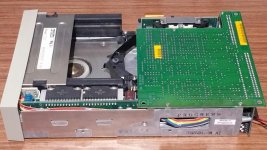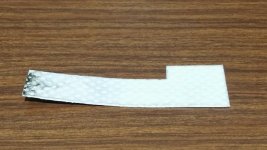I've been playing around with a DEC TZ30 CompacTape drive this week - so far without much success.
The drive itself seems to be working fine. It's installed in a MicroVAX 3100 Model 90 running VMS 5.3. It seems to be a fairly robust design - no rubber rollers anywhere in the tape path, and no drive belts. The two spools are direct-drive and the only other items in the tape path appear to be a couple of stainless-steel capstan/tacho assemblies. The to-and-forth jogging that the drive does when a tape is inserted is quite interesting to watch.
The big problem I'm having is residue build up on the heads that causes the drive to be incapable of reading a tape. For example, if I MOUNT and attempt to do a DIR on the DEC VMS 5.1 distribution tape shown in the attached photo, I get to see the DIR listing of about the first 9-14 files, but the DIR operation then aborts. The tape can't be read again successfully until I clean the heads with a cleaning probe bathed in isopropyl alcohol. The third picture shows the fouling that occurs on a single read attempt. The same volume of residue continues to accrue on each attempt, even after about 10 attempts.
Presumably I'm dealing with disintegrating media here? Is this a common problem with TK50 tape (CompacTape)? If so, is there a known work-around (baking the tapes etc)? Or should I write this off as being a futile exercise?
I'm keen to get this working if I can as I have several hundred tapes to explore (some of which may have material worth archiving) and a number of early-90s VAXes with CompacTape drives installed.



The drive itself seems to be working fine. It's installed in a MicroVAX 3100 Model 90 running VMS 5.3. It seems to be a fairly robust design - no rubber rollers anywhere in the tape path, and no drive belts. The two spools are direct-drive and the only other items in the tape path appear to be a couple of stainless-steel capstan/tacho assemblies. The to-and-forth jogging that the drive does when a tape is inserted is quite interesting to watch.
The big problem I'm having is residue build up on the heads that causes the drive to be incapable of reading a tape. For example, if I MOUNT and attempt to do a DIR on the DEC VMS 5.1 distribution tape shown in the attached photo, I get to see the DIR listing of about the first 9-14 files, but the DIR operation then aborts. The tape can't be read again successfully until I clean the heads with a cleaning probe bathed in isopropyl alcohol. The third picture shows the fouling that occurs on a single read attempt. The same volume of residue continues to accrue on each attempt, even after about 10 attempts.
Presumably I'm dealing with disintegrating media here? Is this a common problem with TK50 tape (CompacTape)? If so, is there a known work-around (baking the tapes etc)? Or should I write this off as being a futile exercise?
I'm keen to get this working if I can as I have several hundred tapes to explore (some of which may have material worth archiving) and a number of early-90s VAXes with CompacTape drives installed.



